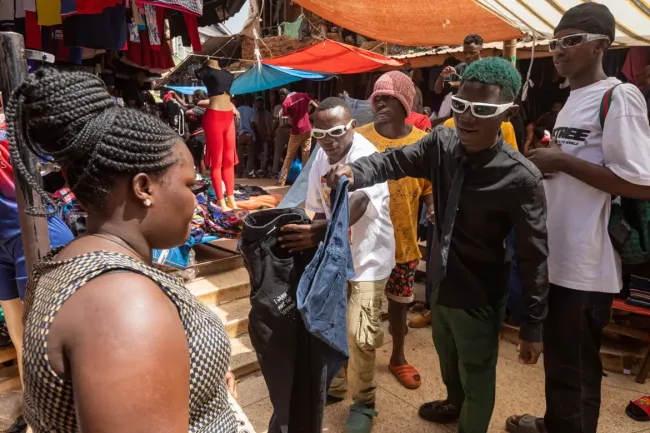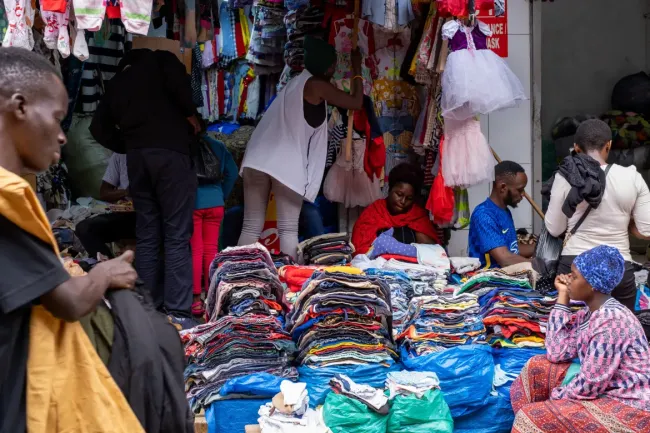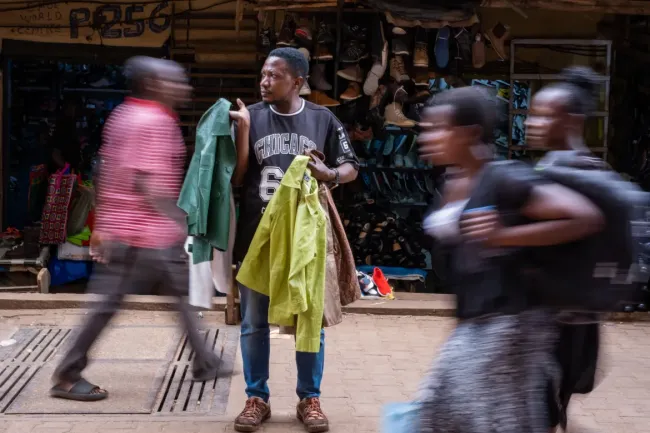For nearly three decades, the chaotic, overcrowded Owino second-hand market in Uganda’s capital has been the cornerstone of Hadija Nakimuli’s life, helping the widowed shopkeeper build a house and raise 12 children.
But a potential government ban on the sale of used clothing threatens to sever this crucial lifeline for Nakimuli and tens of thousands of vendors like her.
“Where is our future if they stop second-hand clothes?” the 62-year-old asked, rummaging through her stash of underwear, dresses, shoes and bags.
Established in 1971, the sprawling market employs some 80,000 people, 70 percent of them women, according to Kampala city authorities.

“Other than students, my clients include ministers [and] members of parliament who call me to deliver clothes to their air-conditioned offices,” said Joseph Barimugaya, whose stall stocks menswear.
“This trade should not be tampered with. Everyone benefits, including the government, which gets taxes,” the father of four said.
Every day, hundreds of customers squeeze through the narrow alleys separating the makeshift wooden stalls, eager to grab a bargain.
Here, a second-hand Pierre Cardin blazer goes for 40,000 Ugandan shillings ($11), a fraction of the price of a new one.

“As a teacher, I earn less than 500,000 shillings [$131]. If I am to buy a new garment, it means I would spend all my salary on clothing,” Robert Twimukye, 27, said while shopping at Owino on a Saturday afternoon.
He is not alone.
Although there are no official figures available, the Uganda Dealers in Used Clothings and Shoes Association estimates that 16 million people – one in three Ugandans – wear used clothing.
‘Everyone is into secondhand clothes. Only a few people in Uganda can afford new clothes,’ said Allan Zavuga, retail manager of Think Twice, which employs 30 staff across three branches in the country. ‘Banning it in Uganda is doing a disservice to the population and also the country at large,’ he said
East Africa imports about an eighth of the world’s used clothing, providing jobs for some 355,000 people who earn $230m a year, according to a 2017 study by the US government’s aid agency USAID.
But the sector has also been a longstanding sore point for governments in Africa, who say the cast-offs harm the domestic textile industry.

‘These clothes are from the dead in a foreign country. When a white [person] dies, the clothes are sent to Africa,’ President Yoweri Museveni said in August this year. ‘I have declared war on secondhand clothes to promote African wear,’ he said.
Uganda’s state minister for trade, David Bahati, said it was a question of ‘dignity’. If the proposed ban goes ahead, ‘we will be able to replace these second-hand clothes’, he added. ‘It cannot be done in one day, but we can do it in a gradual manner,’ Bahati said.
The government is examining the issue, intending to potentially implement the ban in January. ‘The government is ready to give investors incentives … such as tax holidays to ensure we process our cotton into new garments to cover the market demands,’ Bahati said
Uganda has been here before. In 2016, Museveni sought to ban used clothing as part of an East African initiative to develop domestic industries but faced significant opposition from the Kampala City Traders Association.
Diplomatic considerations also played a part. Initially, the East African Community regional bloc put up a united front. But the alliance cracked after Kenya, Tanzania and Uganda baulked at the prospect of retaliatory loss of duty-free access to US markets.
Diplomatic considerations also played a part. Initially, the East African Community regional bloc put up a united front. But the alliance cracked after Kenya, Tanzania and Uganda baulked at the prospect of retaliatory loss of duty-free access to US markets.
At Owino, geopolitics is far from the minds of shoppers and sellers alike. ‘Who did the government consult [before deciding] to ban secondhand?’ second-generation shopkeeper Harriet Musoke Kyambadde asked, her voice trembling with indignation. ‘Banning this business will be sending me into abject poverty,’ the mother of three said, throwing her hands in the air.
A man selling second-hand clothes stands while waiting for customers at a market in Kampala.
THANK YOU for constantly reading stories on TodayGhanaMedia.com, news publishing website from Ghana. Kindly like, follow, comment, and SHARE stories on all social media platforms for more entertaining updates!
Follow us on Twitter: https://twitter.com/
Source: BBC

Admission is still in progress… Get yourself trained in any of our programmes to become a professional healthcare practitioner. Apply now! visit: racoh.edu.gh
 TodayGhanamedia.com Serving With Integrity & Professionalism
TodayGhanamedia.com Serving With Integrity & Professionalism





